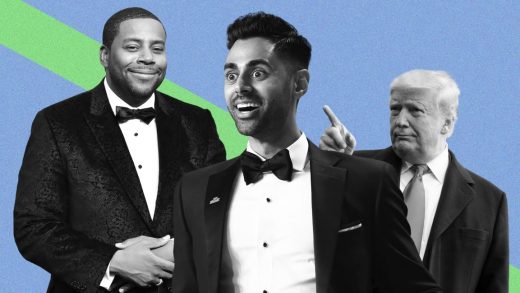White House Correspondents’ Association invites comedians back after caving to Trump. But the damage is done
It’s been nearly two years since comedian Michelle Wolf killed civility.
The cause of death? A joke about then-White House press secretary Sarah Sanders’s perpetual dishonesty and impeccable eyeshadow. After Wolf’s dig at Sanders during the 2018 White House Correspondents’ Dinner, a shockingly bipartisan outrage proliferated online, leading Donald “grab ’em by the pussy” Trump to condemn Wolf as “filthy.” Reeling from the blow to its perceived good name, the WHCA denounced Wolf as well and later did away with the tradition of comedians roasting the current administration during its annual affair. The 2019 edition featured historian Ron Chernow leading the rather muted festivities, with zero risk of offending the president along the way. Civility, it seems, had been restored.
This week has seen a plot twist to the saga, though. The WHCA has just announced that the 2020 Correspondents’ Dinner will not only feature a comedian again, but two comedians: host Kenan Thompson and returning roast-doer Hasan Minhaj. This is what’s known in technical terms as “a double whoopsie-daisy,” the equivalent of putting twice as much toothpaste back in the tube. But it’s not enough to erase the damage the organization did to its own reputation by throwing Michelle Wolf to the wolves.
The White House Correspondents’ Association was born in 1914 to promote “the interests of those reporters and correspondents assigned to cover the White House” in response to rumors that then-president Woodrow Wilson’s administration had formed a committee to determine which journalists should cover his press conferences. The WHCA threw its first annual dinner in 1920, with Calvin Coolidge becoming its first presidential attendee in 1924. Over the years, all kinds of entertainers performed at the annual event, from lounge singers to cabaret acts, but only in 1983 did the WHCA arrive at the tradition of having a comedian perform a spotlight roast of the administration.
Between the first comedian tasked with the roast, political satirist Mark Russell, and Michelle Wolf in 2018, a few other comedians made a splash at the event. Stephen Colbert sort of became Stephen Colbert during his 2006 turn, in which he called out then-president George W. Bush with an epic performance of the right-wing-pundit version of himself he’d honed on The Daily Show and Colbert Report.
“Now, I know there are some polls out there saying that this man has a 32% approval rating,” Colbert said at one point, deep in character. “But guys like us, we don’t pay attention to the polls. We know that polls are just a collection of statistics that reflect what people are thinking in ‘reality.’ And reality has a well-known liberal bias.”
The acid-tinged speech, delivered directly to Bush himself in the audience, was deemed too edgy by many critics. The president of the WHCA, however, never issued a public statement of “regret” about having Colbert as host, as Margaret Talev did in 2018 after Michelle Wolf’s roast. Instead, the organization merely brought on family-friendly impressionist Rich Little the following year for a considerably tamer celebrity roast.
Perhaps the difference between Wolf’s set and any previous comedians isn’t her perceived edginess but rather the Trump factor. After all, it’s widely rumored that the White House Correspondents’ Dinner is part of Trump’s origin story. Hot on the heels of the then-game show host’s racist birther conspiracy theory about then-president Barack Obama, Trump sat in attendance during the 2011 edition, in which host Seth Meyers made fun of him for roughly two and a half minutes. (Obama later made fun of Trump at the event as well.) Whether it’s in the interest of not reliving the experience of being laughed at in person during a correspondents’ dinner, or just part of his overall ongoing project of delegitimizing mainstream media, Trump has boycotted the event all three times thus far, and he reportedly told his administration to do the same. He’s even held some of those radical self-care exercises he calls “rallies” on the same night as the WHCD in years past, in case his ire toward the event was unclear.
While Trump’s hostility to the press in general, and the WHCA in particular, should have made the organization more resolute against capitulating to him after the Wolf flap in 2018, that is exactly what they did. Instead of merely finding a safely inoffensive comedian, whoever the 2019 version of Richard Little might have been (Tracey Ullman?), the organization bucked tradition and forsook comedy altogether. They affirmed all the broken monocles littering the streets of D.C. in the wake of Wolf’s performance the previous year: Trump was right—the funny lady was too filthy and too mean.
How could they ever have guessed that a year later, the subject of Wolf’s infamous joke, Sarah Sanders, would make fun of Joe Biden’s stutter in a since-deleted tweet (“I I I I I I I I I I I I I I I hhhave absolutely no idea what Biden is talking about”) or that Donald Trump would joke that a recently deceased congressman who had turned against him is now in hell? Who could have possibly predicted that the outrage around Michelle Wolf’s joke was completely insincere grievance-pageantry, and that caving in to it would look atrocious in the eyes of history?
Among his many other offenses, Donald Trump’s ongoing efforts to exclude journalists from covering various events are exactly the kind of thing the White House Correspondents’ Association was founded to fight against. After the manufactured Michelle Wolf controversy, they chose to simply surrender.
Even though the WHCA is trying to get back on track by bringing back comedy with Hasan Minhaj and Kenan Thompson, they can’t take back what they did.
(14)



